Iran's Chief Justice Urges Action Against Hijab Opponents
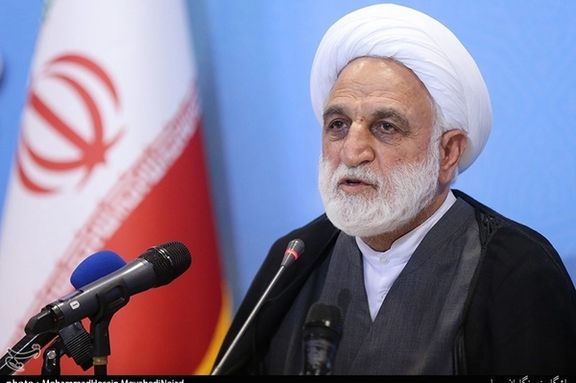
Iran’s judiciary urged law enforcers to begin punishment of opponents of compulsory hijab while awaiting the approval of the contentious Chastity and Hijab bill.

Iran’s judiciary urged law enforcers to begin punishment of opponents of compulsory hijab while awaiting the approval of the contentious Chastity and Hijab bill.
Chief Justice Gholahossein Mohseni Ejei called on the police and the ministry of interior to take immediate measures amid yet more crackdowns while the law is awaiting final approvals from authorities who have cited "ambiguities" in the proposal.
Initially presented by the Judiciary, the Chastity and Hijab bill was later modified by a commission consisting of select members of the parliamentary judiciary and cultural committees, without being debated in the parliament's open session. The modified bill was eventually approved with the addition of more articles.
On September 20, parliament members endorsed the bill with a three-year experimental period and forwarded it for approval to the Guardian Council.
However, last week, the Guardian Council and the Expediency Council criticized the bill, which had been approved by a special parliamentary commission, citing “ambiguities,” and subsequently sent it back to the parliament for clarification.
Anti-hijab sentiment is still high, however. Shargh daily recently conducted a poll, revealing that a significant 84% of respondents expressed their opposition to compelling women to observe the hijab. Of the 12,334 participants in the poll, 84.21% believed that the implementation of the Chastity and Hijab law would not result in an increased hijab compliance among women.t
In September, the United Nations branded the law "gender apartheid".
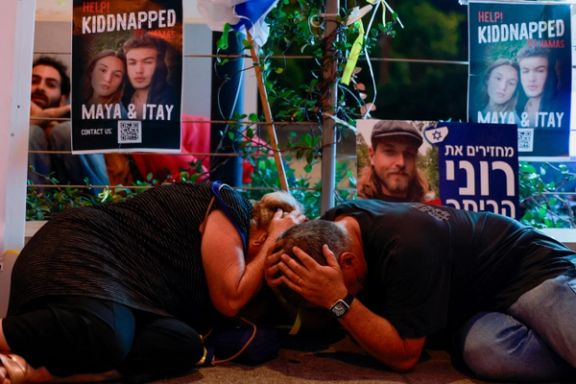
A young soldier of Iranian origin has been named as the latest victim confirmed dead following the Hamas massacre of October 7 in Israel.
In an emotional farewell, Shirel Haeimpour’s grandfather sang a traditional Jewish love song and a wedding song with his Esfahani Persian accent for the young woman who will never get to stand under the traditional canopy, or ‘chuppah’.
From the town of Rishon Lezion, Shirel’s loved ones gave moving speeches about her as Israel mourns the more than 1,400, mostly civilians, murdered on the day now considered the most deadly day for Jews since the Holocaust.
Another more than 230 have been taken hostage to Gaza, including babies and children.
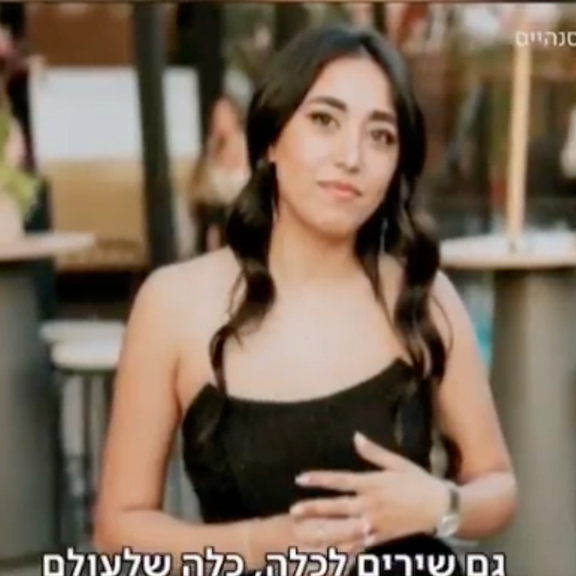
It was her last weekend as a soldier in the mostly female base near Kibbutz Nahal Oz, one of the many villages where civilians were slaughtered and homes destroyed by the thousands of Hamas militants who invaded Israel by air, land and sea.
The girls’ duty was to watch the country’s most active border. The base had a policy of 'you see, you shoot’, the Gaza border a constant threat since Hamas took over control of the strip.
In a chilling recollection, her boyfriend Ariel Ben Uri, spoke of her constant fears that one day, Hamas would break through and invade, feeling that both the soldiers and the civilians around them were not safe from terrorist infiltration. “You were right,” he said, fighting back tears.
The youngest daughter of four, her brother Barak spoke of her bravery as she leapt out of bed as the tragedy unfolded to go straight to the emergency room. Hamas drones had blacked out the cameras meaning there were just minutes for the girls to alert others of an imminent attack.
“You saved lives and chose to help,” he said, speaking through his tears at the ceremony in Rishon Lezion, south of Tel Aviv.
News of her death was felt by the Iranian diaspora. Karmel Melamed wrote on X: “As an Iranian American I weep for Shirel Haeimpour, an innocent Iranian-Israeli young woman slaughtered by Hamas barbarians.
“She came from Isfahani (Esfahani) Jewish roots which are ancient. Just as we mourn the loss of Armita in Iran, we also mourn the loss of Shirel in Israel,” referring to a 16-year-old schoolgirl, who was pronounced dead after spending four weeks in coma in Tehran, following a scuffle with hijab police.
Among the murdered were hundreds of dual citizens from countries including France, the UK, and the US. Dozens of local Arabs and Bedouins were also murdered.
The hostages now include around 30 nationalities, Israelis, dual-nationals, foreign workers and tourists.
Hamas has demanded the release of 6,000 prisoners in return for the hostages, though it claimed recently 50 have died in Israeli airstrikes on the strip.
In 2011, Israel released over 1,000 Palestinians from its jails in return for one Israeli soldier, Gilad Shalit. In a bitter twist, many of them, including Hamas' leader in the Gaza Strip, Yahya Sinwar, ended up being among those who masterminded and executed the surprise attack on October 7.
Experts warn that the latest situation would set a dangerous precedent not only to Hamas but to Israel’s archenemy Iran. In August, the Biden administration agreed to unblock $6b of frozen Iranian funds in south Korea in exchange for five dual-national US-Iranians held hostage in Iran. Many warned at the time that the “largest ransom in history” would embolden the Iranian regime and other would-be hostage takers.
In the meantime, Israel has vowed to continue its ground invasion of Gaza until both Hamas is destroyed and the hostages are brought home, as the war enters its fourth week.

Jake Sullivan, the US National Security Advisor, has blamed the Iranian authorities for the death of a 16-year-old in the hands of hijab enforcers.
In his statement on X, Sullivan said, "I am deeply saddened to learn of the tragic passing of Armita Geravand, who was brutally beaten by Iran's morality police for not conforming to public hijab mandates. The state-sponsored violence against its own citizens in Iran is abhorrent and underscores the vulnerability of the regime."
The incident occurred on October 1 when Armita fell into a coma after an altercation with hijab enforcers in the Tehran subway. Despite the Iranian government's efforts to obscure the details of the confrontation, it appears that she was forcibly pushed by a female agent, resulting in a severe head injury. Her death was subsequently confirmed by Iranian state media on Saturday.
There has been a national outpouring of grief for her death which echoed the death of Mahsa Amini last year in morality police custody. Videos received by Iran International showed protesters in Ekbatan, located in the west of Tehran, chanting slogans like "Death to the dictator" and "Death to Khamenei the murderer" on Sunday night. Similar protest slogans were reported in other parts of Iran on the same night, including Mashhad, Shiraz, Karaj, and Sari.
Additionally, Iranians living abroad have shown their solidarity by participating in gatherings in Toronto and London, where they voiced their opposition to the continued repressive policies of the Islamic Republic.
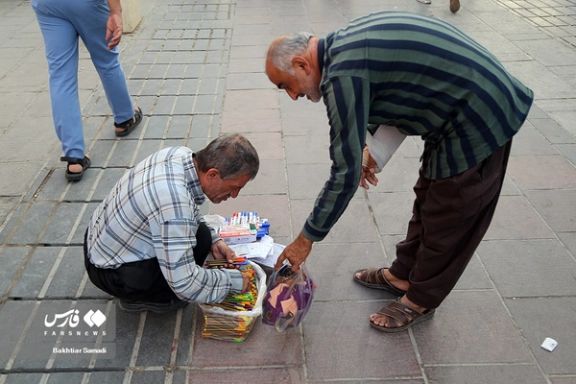
Iran’s government has proposed a 20 percent pay raise for civil servants next calendar year (starting March 21), despite a rampant inflation of over 46 percent.
Experts say the low increase proposed by the government reflects its need to reduce expenditures and to avoid a higher budget deficit, which is at least 50 percent.
According to a report prepared by the parliament’s research center that was released last week, this year’s budget deficit may amount to $13.5 billion, or 30 percent, but independent analysts believe the deficit is closer to half the budget. In the current year the government has failed to secure half of the revenues expected from oil and gas sales and the same trend is expected to continue in the coming year.
Budget deficit amounted to $10 billion in the first four months of the current year, the report said.
The proposed small increase in civil servants’ salaries is worrisome to workers, who need to afford basic necessities amid the high inflation environment. Most of these workers are civil servants or employed by government-owned and pseudo-governmental companies.
Iran witnessed several rounds of anti-regime protests and workers strikes since 2017, and the economic crisis is believed to be the main factor in driving hopeless young people to rebel.
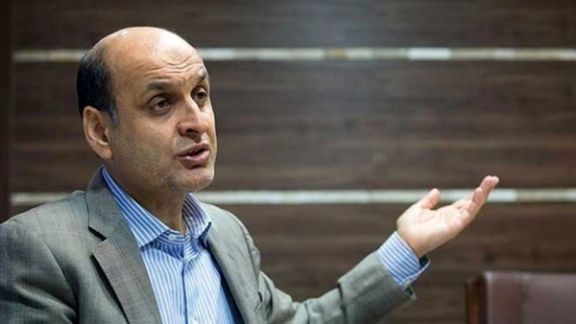
The Statistics Center of Iran (SCI) and the Central Bank claim that the rate of annual inflation has dropped to 45.5 percent, nearly the same level as a year ago, and the economic growth rate rose to above six percent between April and July. But official figures tend to underreport bad news and cannot be independently verified. One thing which is clear is that food prices have risen much faster than the official inflation rate, in some instances hitting 100-percent in 2022.
Many reports by local media say prices for some food items has also doubled in 2023, since the same time last year. For instance, based on the figures released by the SCI, the price of mutton and beef have risen by 151 and 132 percent respectively this year.
Economist Hadi Haghshenas, speaking to local media, expressed concern about the “alarming” rate of inflation and said the reason for the small drop in the rate of inflation is a drastic reduction in people’s purchasing power rather than economic improvement as the share of food and housing in the basic commodities basket has risen from around 50 percent to between 70 and 80 percent.
People’s actual experience of the economic realities is in contradiction with the figures that the government announces, he told the reformist Shargh daily, adding that the budget deficit, high inflationary expectations, and “ambiguity in foreign policy” all indicate that improvement in economy should not be expected.
Sanction imposed by the United States since 2018 have plunged Iran into economic crisis, but efforts by the Biden administration to resolve differences with Tehran over its nuclear program have failed so far.
Experts say the chasm between the rich and the poor is increasing, and the middle class is vanishing fast despite the promises of President Ebrahim Raisi’s government to “increase social justice”.
High inflation of over 40 percent in the past few years has been taking its toll on the poor and the middle class who are increasingly finding it impossible to afford some basic needs, particularly food and housing, as the increase in salaries and wages has not kept up with inflation. The share of education and leisure have accordingly dropped to a record low in the past few years.
Naser Rahchamani, a former member of the Supreme Labor Council, a body made of representatives of workers, businesses and the government, which is responsible for setting the minimum wage of workers, says the society has hugely become poorer this year and the purchasing power of workers has drastically dropped in comparison with previous years.
“It seems that the government has shut its eyes to the livelihood problems of the workers who constitute half of the country’s population [with their families],” Rahchamani told the reformist Etemad newspaper.
“Production did not increase…and inflation remained high,” he said while stressing that the cost of sanctions weighed on the shoulders of workers who bore the brunt of high prices.
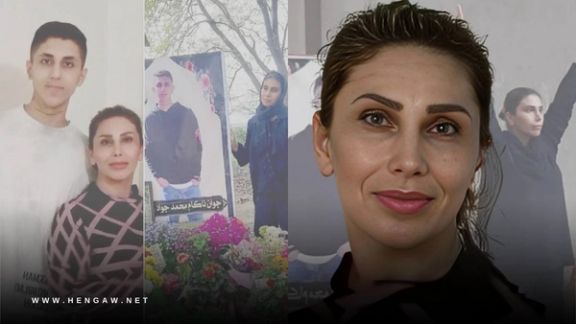
Mahsa Yazdani, the mother of Mohammad Javad Zahedi, one of the casualties of Iran’s nationwide protests in 2022, has been sentenced to 13 years in prison.
Yazdani was sentenced in the Revolutionary Court of Sari, northern Iran, under charges including insulting sanctities, endangering state security and insulting the Supreme Leader of the Islamic Republic, Hengaw Human Rights organization reported.
Under the law on the combination of sentences, her most severe punishment, which is five years in prison, will be enforceable.
Mitra Zahedi, the daughter of Yazdani, shared in an Instagram story: "What will happen to my three-year-old brother? Who is responsible for all this injustice?"
Mohammad Javad Zahedi was killed by the gunfire of security forces during the nationwide protests in Sari at the age of 20 in September last year.
Since September 2022, when widespread anti-regime protests broke out, security forces have killed well over 500 civilians and severely wounded hundreds. Many young protesters were targeted by shotgun pellets in the face and lost one or both eyes. The regime also arrested 22,000 people, including journalists and hundreds of minors.
Yazdani has always been the voice for justice for her slain son in the past year and has been alongside other families of the victims of the protests.
Initially detained by security forces in Sari, she was transferred to an unknown location on August 22 before being released on bail on September 25. An immediate sentence has been issued for her.
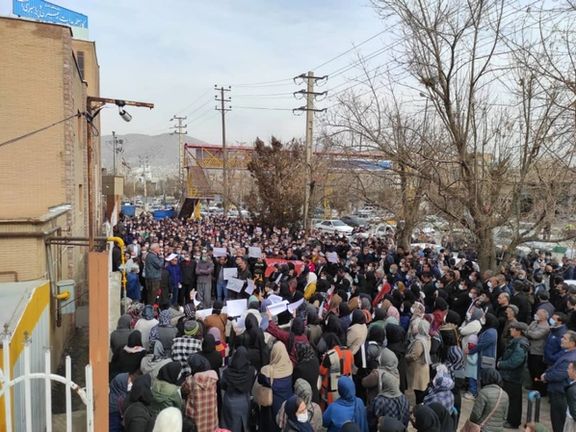
The Iranian Teachers' Association has released a statement condemning the death of Armita Geravand, who lost her life after a confrontation with hijab enforcers.
The association's statement acknowledges Armita, along with Mahsa Amini and other young girls, as “courageous fighters who took a stand against the authoritarian regime's ideological policies. Their unwavering resilience came at the ultimate cost of their lives.”
On October 1, Armita, 16, fell into a coma after an encounter with hijab enforcers in the Tehran subway. While the government has attempted to obscure the details of the incident, it appears that she was pushed by a female agent, resulting in a severe head injury.
Security measures were taken to prevent the dissemination of information or photographs or CCTV footage from the scene at Tehran's Fajr Hospital. She was subsequently declared brain dead and died in hospital on Saturday.
On Monday, the association, which stands bravely against the Islamic regime in the face of continued oppression of dissenting voices, including targeting academia, said: “Armita's case is one of several in which young girls have paid a heavy price for their defiance in advocating for optional hijab."
It stated that the option to wear hijab, mandated by the regime since its formation in 1979, "plays a pivotal role in advancing the democratic process of the Iranian people".
The group said: "Gender equality is an essential component of democracy, and the pursuit of optional hijab represents a realistic and achievable aspiration, vital for the realization of this democratic process."